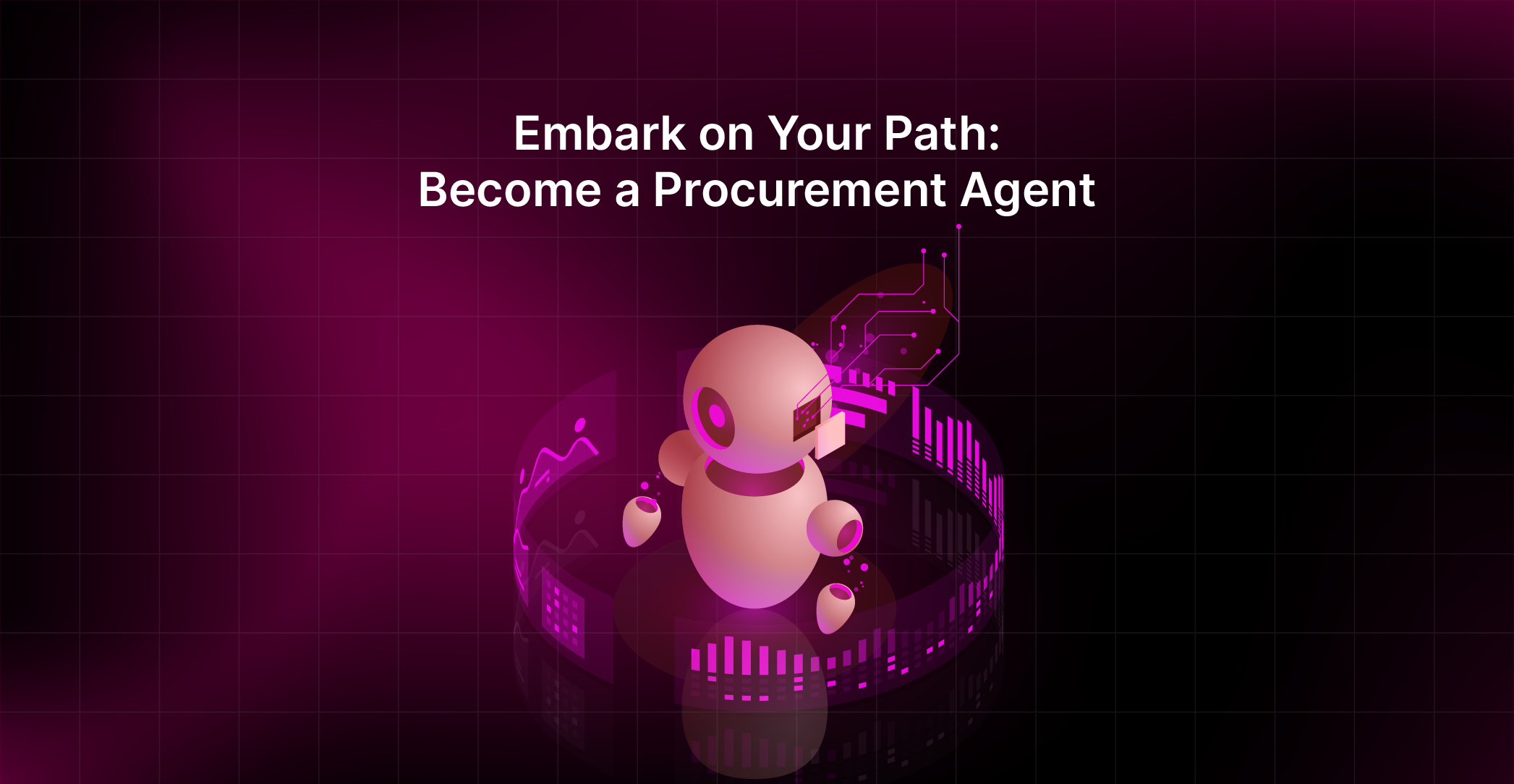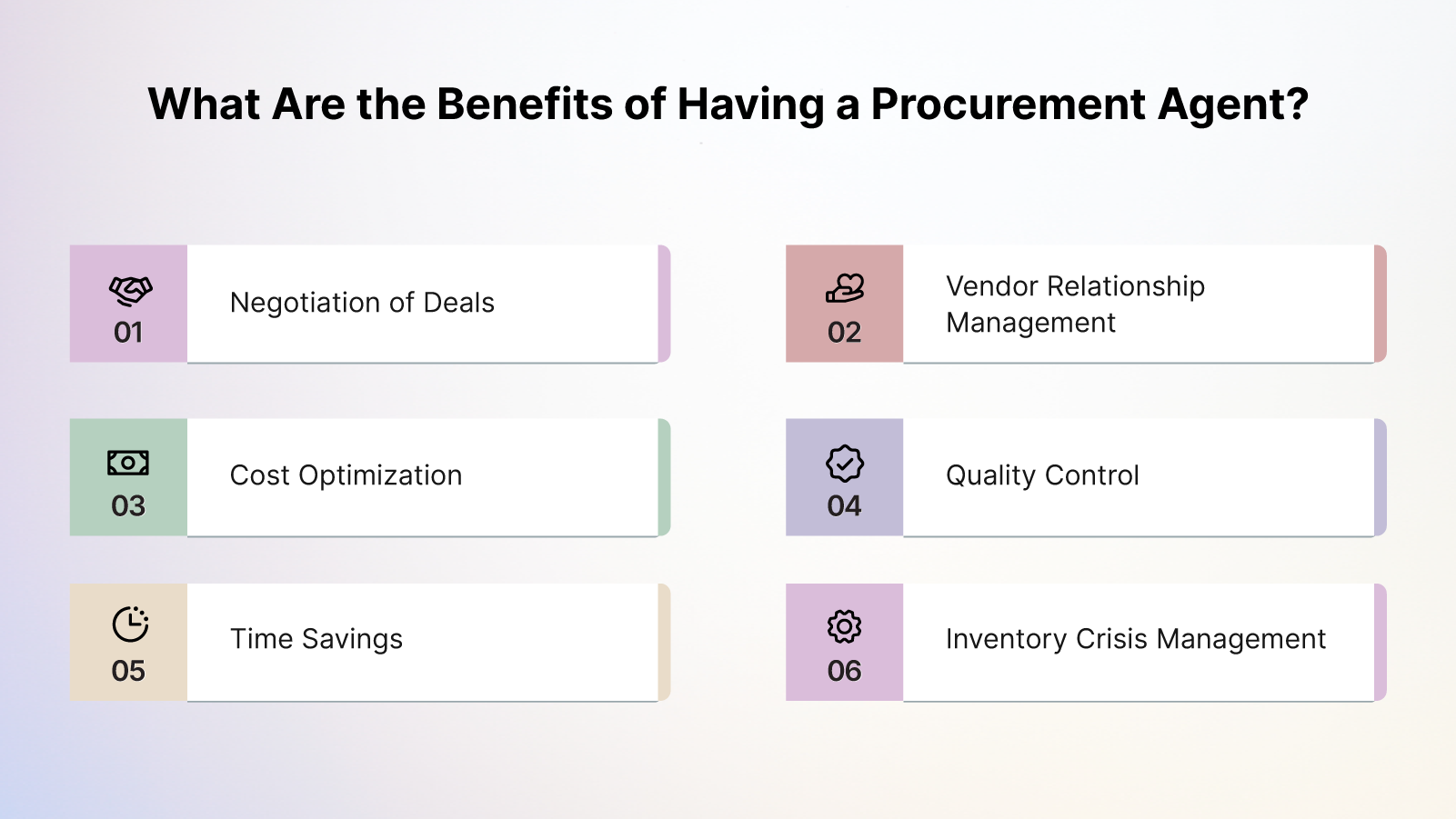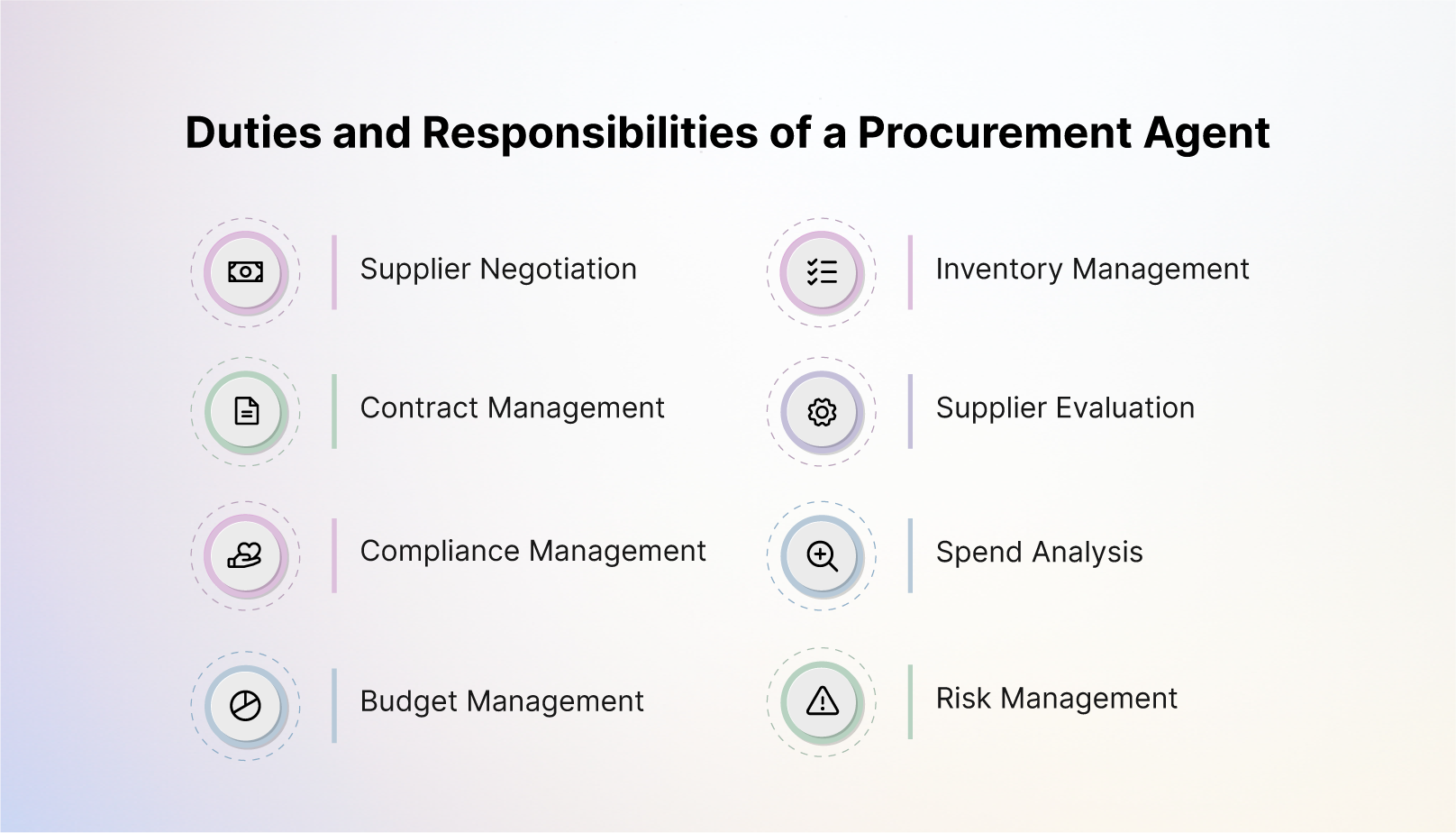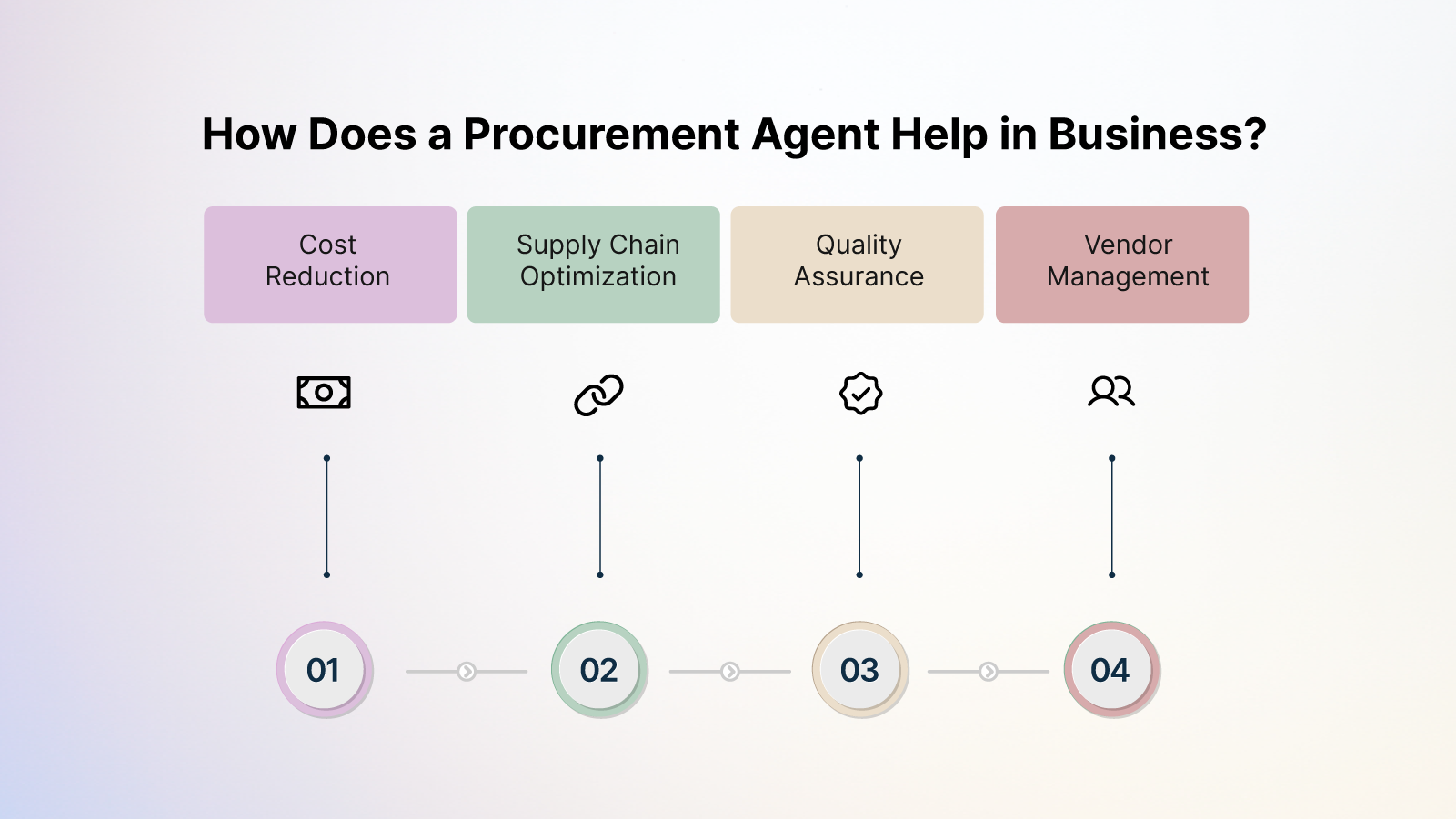

Procurement Agent: What Is It and How to Become One

Procurement Agent: What Is It and How to Become One
Discover what a procurement agent does, how they optimize costs and supply chains, and the key skills needed for success in today’s business environment.


A procurement agent is a crucial role in businesses of all sizes. They are responsible for sourcing and purchasing goods and services. They ensure that the procurement process runs smoothly, from negotiating deals with suppliers to managing inventory levels. As businesses grow, so does the complexity of procurement. A skilled procurement agent can help businesses optimize costs, streamline operations, and maintain strong vendor relationships.
This blog covers:
- What is a Procurement Agent?
- What are the Benefits of Having a Procurement Agent?
- Procurement Agent Daily Tasks
- Duties and Responsibilities of a Procurement Agent
- Skills and Qualities of a Proficient Procurement Agent
- How Does a Procurement Agent Help in Business?
- Frequently Asked Questions on Procurement Agent
What is a Procurement Agent?
A procurement agent is responsible for sourcing and purchasing goods or services for a company or client. Their duties include preparing purchase orders, negotiating contracts with vendors, managing supplier relationships, and ensuring timely delivery. They may also attend trade shows to explore new supplier opportunities.
What are the Benefits of Having a Procurement Agent?
A procurement agent offers many advantages to businesses. They help streamline purchasing processes and optimize costs. Their expertise in negotiation and vendor management ensures that companies get the best value from their suppliers.

Below are some of the key benefits of having a procurement agent:
Negotiation of Deals
Procurement agents are expert negotiators with the capabilities to secure favorable terms with suppliers. By leveraging their skills, they ensure that the company obtains high-quality goods and services at the most competitive prices, contributing to overall cost savings.
Vendor Relationship Management
Strong relationships with vendors are crucial for ensuring timely deliveries and resolving potential issues. Procurement agents manage these relationships. They help foster partnerships that benefits both the business and the supplier.
Cost Optimization
By closely analyzing spending patterns and market trends, procurement agents identify opportunities to reduce costs. They optimize procurement budgets by avoiding unnecessary purchases and negotiating bulk discounts.
Quality Control
Procurement agents oversee the quality of purchased goods, ensuring that suppliers meet the company’s quality standards. This proactive approach reduces the risk of defective products, which could disrupt operations or lead to customer dissatisfaction.
Time Savings
A procurement agent handles all the procurement tasks, which includes everything from sourcing suppliers to managing purchase orders. This frees up time for other departments and lets them focus on their core responsibilities without being bogged down by procurement logistics.
Inventory Crisis Management
Procurement agents quickly manage inventory-related crises by maintaining close communication adequate with suppliers. They ensure that inventory levels are adequate, which avoids the risk of shortages or overstocking.
Procurement Agent Daily Tasks
Procurement agents manage a wide range of tasks daily to ensure smooth operations. It includes negotiating with suppliers, managing purchase orders, monitoring inventory, and ensuring supplier performance. Procurement agents help companies secure the best deals, maintain quality standards, and avoid disruptions.

Here are the key daily tasks they perform:
- Negotiating Prices: Every day, procurement agents negotiate prices and contract terms with suppliers, making sure that the company gets the best deals. They also keep a keen eye on emerging market trends to predict price fluctuations. They use their negotiating skills to get favorable terms from suppliers.
- Managing Purchase Orders: From creating to tracking purchase orders, procurement agents ensure that orders are placed and fulfilled on time. They also monitor purchase orders for any issues that may arise, like discrepancies between the order the goods received.
- Inventory Control: Procurement agents work closely with inventory managers to keep track of stock levels. They ensure that the business doesn’t run into shortages or end up overstocking. Procurement agents are good at efficiently balancing supply and demand.
- Supplier Performance: To maintain high-quality standards, procurement agents regularly assess supplier performance. They look at factors such as delivery times, product quality, and pricing consistency to ensure suppliers meet the company’s expectations.
- Researching Pricing Trends: Procurement agents must stay informed about current market conditions and pricing trends. This knowledge helps them anticipate price changes and adjust procurement strategies accordingly, ensuring that the business remains competitive.
Duties and Responsibilities of a Procurement Agent
A procurement agent's responsibilities go beyond daily tasks. They include strategic planning and relationship management to ensure procurement aligns with business goals. Additionally, they play a key role in optimizing costs, improving supplier performance, and mitigating supply chain risks.

Below are some of their key duties and responsibilities:
- Supplier Negotiation: Procurement agents handle all negotiations with suppliers. They ensure the company gets the best possible terms for price, delivery. and quality.
- Spend Analysis: They monitor procurement spending to find areas where costs can be cut or optimized, helping the business save money in the long run.
- Inventory Management: Procurement agents work closely with inventory managers to make sure that stock levels align with business needs, which balances costs and prevents shortages.
- Contract Management: From drafting to reviewing and managing contracts, procurement agents ensure that all contractual obligations are met, and they negotiate renewals when necessary.
- Supplier Evaluation: Procurement agents regularly evaluate suppliers to ensure they continue to meet the company’s standards for quality, delivery, and cost.
- Risk Management: They assess and mitigate risks associated with supply chains, such as price fluctuations, geopolitical risks, and supplier reliability issues.
- Budget Management: Procurement agents ensure that procurement activities stay within budget and that cost-saving opportunities are identified and pursued.
- Compliance Management: They ensure that procurement processes comply with internal policies and external regulations, safeguarding the company from legal risks.
Skills and Qualities of a Proficient Procurement Agent
A proficient procurement agent needs both technical skills and soft skills, including negotiation,
financial analysis, communication, and relationship management.These abilities help them secure favorable deals, maintain vendor relationships, and optimize procurement processes for cost savings.
Here are the key skills and qualities a proficient procurement agent needs:
- Negotiation Skills: Procurement agents need excellent negotiation skills to secure favorable terms with suppliers. They must be able to balance cost savings with quality and reliability.
- Analytical Thinking: The ability to analyze data and trends is critical in procurement. Agents use their analytical skills to make informed decisions about purchasing strategies and supplier selection.
- Relationship Management: Building and maintaining strong relationships with suppliers is essential. Procurement agents must foster positive working relationships to ensure smooth operations and mitigate potential issues.
- Communication Skills: Clear communication is vital for procurement agents, as they liaise between suppliers and internal departments. They must convey their needs and expectations accurately to prevent misunderstandings.
- Financial Acumen: Procurement agents should understand budgeting and financial management principles to make cost-effective purchasing decisions.
- Risk Management: They need to anticipate and manage risks, such as supply chain disruptions or price volatility, to protect business from disruptions and price volatility.
- Attention to Detail: Procurement agents must pay attention to finer details to the finer details in contracts, orders, and negotiations to avoid costly mistakes.
- Strategic Thinking: Successful procurement agents align strategies with the company's broader business goals, ensuring that procurement activities contribute to long-term success.
How Does a Procurement Agent Help in Business?
Procurement agents play a crucial role in helping businesses by reducing costs, optimizing the supply chain, ensuring quality control, and managing vendor relationships. Their expertise leads to smoother operations, cost savings, and improved supplier performance, all of which contribute to overall business success.

Here's how procurement agents contribute to the success of a business:
Cost Reduction
Procurement agents play a key role in reducing costs by negotiating favorable terms with suppliers. They closely monitor spending patterns and analyze market conditions to optimize procurement strategies. By securing lower prices, bulk discounts, and better contract terms, procurement agents help businesses cut unnecessary expenses, which directly improves overall profitability.
Supply Chain Optimization
Procurement agents ensure that goods and services are sourced efficiently, reducing the risk of disruptions and delays in the supply chain. They carefully plan procurement activities to meet demand and balance costs and delivery schedules. By streamlining sourcing processes and working closely with suppliers, procurement agents help businesses maintain a steady flow of materials and services. In short, they keep operations running smoothly without interruptions.
Quality Assurance
Procurement agents are responsible for ensuring that the products and services purchased meet the company’s quality standards. They regularly evaluate suppliers and their products to reduce the risk of defects or subpar materials entering the supply chain. By maintaining high standards and conducting quality checks, they help ensure customer satisfaction, prevent costly returns or replacements, and protect the company’s reputation for delivering reliable goods and services.
Vendor Management
Building and maintaining strong relationships with vendors is a critical function of procurement agents. They act as the primary point of contact between the business and its suppliers, fostering positive partnerships that lead to better service, improved reliability, and more favorable terms. These strong relationships enable businesses to secure timely deliveries, avoid supply chain disruptions, and benefit from consistent quality and pricing over time.
Conclusion
Procurement agents play a key role in helping businesses manage their supply chains, reduce costs, and ensure quality control. Their expertise in negotiation, vendor management, and procurement strategy is indispensable in today’s complex business environment. Whether you're considering a career in procurement or looking to hire a procurement agent, their contributions are essential for long-term business success.
Frequently Asked Questions on Procurement Agent
What is a procurement agent’s job description?
A procurement agent is responsible for managing the sourcing and purchasing of goods or services for an organization. Their duties include negotiating contracts with suppliers, managing purchase orders, and ensuring that goods are delivered on time. Procurement agents also work to optimize costs by analyzing supplier pricing and market trends. Additionally, they oversee inventory management to prevent shortages or overstocking, ensuring that procurement aligns with the company’s overall budget and objectives.
What services do procurement agents provide?
Procurement agents offer a wide range of services that streamline the purchasing process. These include negotiating contracts to secure favorable terms, managing supplier relationships, and conducting cost analysis to identify potential savings. They also ensure that purchased goods meet quality standards through regular quality assurance checks. Additionally, procurement agents coordinate logistics, such as delivery schedules and inventory management, to ensure timely and efficient procurement, ultimately helping businesses save both time and money.
Who benefits from hiring a procurement agent?
Businesses of all sizes that regularly purchase goods or services can benefit from hiring a procurement agent. They are particularly valuable for organizations looking to optimize their procurement processes, reduce costs, and manage supplier relationships more effectively. Companies with complex supply chains or those that handle large volumes of purchases will see the most benefit. Procurement agents help ensure that purchases are cost-effective, delivered on time, and aligned with business goals, thereby improving operational efficiency.
How do procurement agents charge for their services?
Procurement agents typically charge for their services in a few different ways. Some charge a percentage of the total value of the goods or services procured, while others may charge a flat fee based on the scope of the project. In some cases, agents work on a retainer basis, offering ongoing services for a regular fee. Alternatively, some procurement agents charge by the hour for specific tasks, depending on the company’s procurement needs.
What is the difference between a procurement agent and a procurement company?
A procurement agent is usually an individual working within a company to manage its purchasing activities. They handle tasks such as sourcing, negotiating contracts, and managing suppliers. On the other hand, a procurement company offers outsourced procurement services, often providing a team of professionals to manage the entire procurement process for businesses. Procurement companies are typically hired by businesses that do not have in-house procurement teams or need additional expertise to handle large-scale purchasing operations.
What is a Procurement Agent?
A procurement agent is responsible for handling all aspects of sourcing and purchasing for a company. They negotiate contracts, manage relationships with suppliers, and ensure that the goods or services acquired meet the company’s quality and budget standards. They work closely with other departments to align purchasing strategies with organizational goals.










.png)




.png)










.avif)


